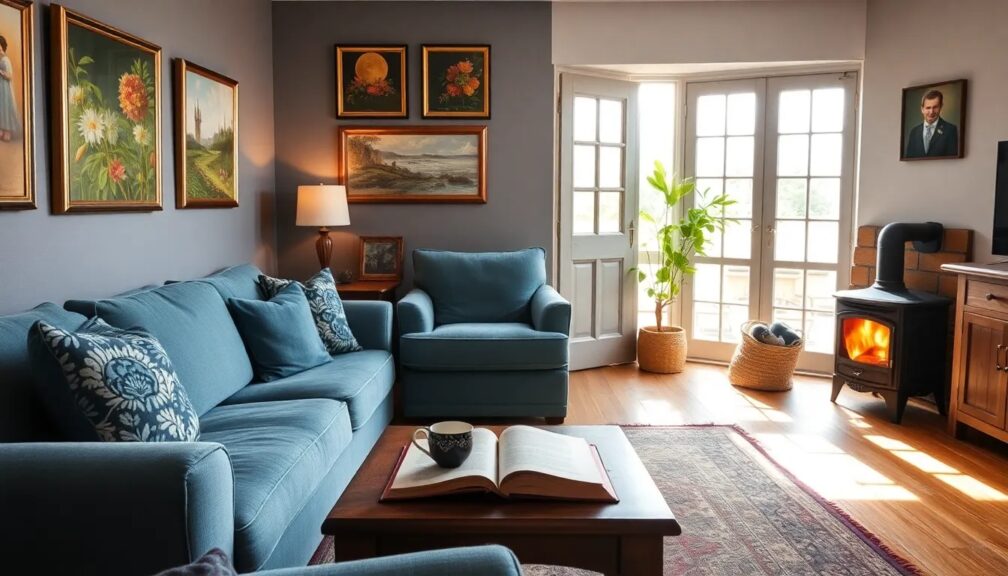How do British say sofa

Bienvenido a este artículo sobre How do British say sofa
When exploring the nuances of British English, one may encounter a variety of terms that differ from their American counterparts. Among these is the word for a common piece of furniture found in living rooms around the world—the sofa. In this article, we delve into the British lexicon to understand what terms Brits use for "sofa," including regional variations and colloquialisms. Whether you're a language enthusiast, a traveler to the UK, or simply curious about British culture, join us as we unpack the terminology used across the pond for this essential home comfort.
How do the British say sofa?
The British have a quintessentially unique way of referring to what many of us commonly know as a sofa. Their vernacular is brimming with charm and idiosyncrasy, adding a touch of class and history to everyday items. If you've ever found yourself binge-watching British dramas or comedies, you might have noticed characters casually mentioning they're going to "have a sit-down on the chesterfield" or perhaps inviting someone to "take a load off on the settee."
Now, you might be on the edge of your seat, wondering why there's such a variety of terms for one piece of furniture. The answer weaves through the tapestry of British culture and social norms. Let's delve into the nuanced differences:
1. Chesterfield: This term is steeped in history, and when you hear it, you're likely picturing a high-end, leather-upholstered sofa with deep buttoning and possibly rolled arms. It's a term that evokes the image of a sophisticated, wood-paneled library in a Victorian mansion.
2. Settee: Another term used interchangeably with sofa, a settee tends to be used to describe a more formal seating option, perhaps something you'd find in a posh tea parlor or an elegant living room.
3. Couch: Although less commonly used in the British lexicon, 'couch' does pop up from time to time, often referencing a more casual or comfortable place to lounge and relax.
4. Davenport: A less frequent term, but when used, it can refer to a specific type of sofa-bed or a large, boxy type of seating furniture.
5. Divan: Hailing from the Ottoman Empire, this term has found its way into British English to describe a sofa without a back or arms, typically placed against the wall with cushions for support.
The nuances are subtle, yet they reveal a fascinating insight into Britain's rich linguistic heritage. Each term tells a story, a glimpse into a different era's social fabric, design preferences, and influences.
So, next time you find yourself contemplating a furniture purchase or tuning into a British TV show, you'll be equipped with a newfound appreciation for the cultural depth behind what might seem like simple terminology. And who knows, perhaps you'll adopt a bit of this British flair yourself and impress your guests with your choice of words when they relax on your very own... well, I'll leave that term for you to decide.
What is a couch called in the UK?
Ever wondered about the charming differences in English that exist between continents? Prepare to indulge in a slice of British culture and uncover the traditional term for one of the most beloved pieces of furniture in any home. Across the pond, the word 'couch' takes a back seat to a term that exudes comfort, style, and centuries of history.
Intrigued? Imagine yourself sinking into plush cushions after a long day, the very embodiment of relaxation just waiting for you. But to join in on this quintessentially British experience, you'll need to know just what to call this inviting piece. It's more than a mere sitting space; it's a symbol of leisure, of tea times, and of the warm, welcoming spirit that British homes are celebrated for.
To fully embrace this cozy corner of British life, you must get familiar with the lingo. And here's a hint: the answer lies within literary classics and the heart of familial comfort zones. Could it be a sofa, or perhaps the more colloquial settee? Each name carries its own story and connotations, waiting to be explored.
Still curious? The journey does not end here. Imagine the conversations that have taken place, the books read, and the cups of tea enjoyed on this very piece of furniture. By delving deeper, you'll not only find out what the British call a couch, but you'll also discover the rich tapestry of UK interior design and how it reflects the nuances of British culture.
So, take a seat (figuratively, of course) and get ready to unveil a term that might just become your new favorite way to refer to that comfy spot in your living room. Trust us, after learning about its significance and charm, you'll never look at your own couch the same way again.
How do you say "couch" in British?
If you've ever found yourself lost in translation while watching a British show, you're not alone. The English language is peppered with intriguing differences that vary from one side of the pond to the other. For instance, that comfortable piece of furniture you love to lounge on, the couch, goes by a different name in the UK.
Curious? You should be! This isn't just a simple case of tomato-tomahto. The British have a knack for infusing charm and character into their words, making the everyday seem just a touch more refined.
Imagine curling up with a cup of tea and a good book on your... well, we're getting ahead of ourselves. To truly grasp the essence of British English, one must delve into the history, the social nuances, and the cultural quirks that give rise to such linguistic variety.
- Is it called a sofa, a settee, or something else entirely?
- Does the term change based on its style, size, or the material it's made from?
- How did this difference in terminology come to be, and what does it say about British culture?
The answers to these questions are bound to fascinate, revealing stories of trade, class distinctions, and the evolution of language. Each term carries a legacy, painting a vivid picture of the society that coined it. You might be surprised to learn that your 'couch' does not just change its name across the ocean—it carries with it a whole new set of associations and implications.
So, before you next sink into your comfy spot, wouldn't you like to know what you'd be sitting on if you were in London or Edinburgh? Dust off your imaginary passport, because we're about to embark on a linguistic journey that will add a dash of sophistication to your vocabulary and leave you eager to impress at your next social gathering. Get ready to discover a term that's as loaded with cultural identity as it is with cushions.
Do Brits use a sofa or couch?
The question of whether the British prefer the term sofa or couch might seem trivial at first glance, but it's a linguistic choice that reveals a tapestry of cultural nuances and historical layers.
Have you ever found yourself binge-watching British TV shows and noticed the characters lounging on a plush piece of furniture, yet you're not quite sure what they called it? It's a subtle detail, one that might escape the ear of an unsuspecting viewer. But, for the discerning ear, there's a story to be told.
In the UK, the word sofa is commonly embraced. This term holds historical significance, stemming from the Arabic word 'suffah', which refers to a bench covered in blankets and cushions. The British love affair with the sofa is steeped in a tradition of comfort and domesticity, making it more than just a seating option—it’s a cornerstone of home life.
On the other hand, the term couch, with roots in the French word 'coucher', meaning to lie down, is less frequently used across the pond. Although you might hear it occasionally, it's often associated with a more casual or even Americanized vocabulary.
But wait, there's a twist in the tale. The British lexicon is not immune to the influences of global media. As American TV shows and movies permeate British screens, the usage of 'couch' may well be on the rise. Is it possible that the American preference for 'couch' is infiltrating British homes?
The implications of this linguistic choice extend beyond mere words, hinting at shifts in social behavior, design preferences, and international influences. What does this say about the evolving British identity? Could this be a sign of a larger cultural shift?
The intrigue doesn't end there. Delving deeper into the British living room, one discovers that this choice of terminology may also relate to regional dialects, social class, and even the design of the furniture itself.
To truly understand the complexities and the potential transformation of British vocabulary and home life, one must look beyond the surface. Are you ready to uncover the changing dynamics of British culture through the lens of a seemingly simple piece of furniture? The answer might just surprise you, and trust us, you don't want to miss this story.
How do british say sofa reddit
Dive into the intriguing world of British colloquialisms where every word paints a picture of culture and tradition. When it comes to the humble couch, you might be surprised to learn that the British have their own unique twist on the term. While you’re sprawled out on your own comfy furniture piece, ever wondered what interesting moniker it might hold across the pond?
The British lexicon is rich with expressions that can send you spinning down a rabbit hole of linguistic delights. Imagine sitting down with a group of Brits and the conversation turns to living room furnishings. You mention your 'sofa,' but they respond with a word that piques your curiosity and makes you lean in closer. They're not just talking about a mere piece of furniture; it's an invitation to explore a world of sophistication and comfort.
Now, hold that thought of discovery because there's a term that stands out in the British vernacular, a word that has the potential to become your next favorite. It's not just a sofa; it's a term that embodies both the comfort of a cozy home and the elegance of British decor. Can you guess what it might be? The anticipation is almost as delicious as a warm cup of tea on a rainy London afternoon.
For those in the know, this term is an endearing part of British culture. Don't find yourself out of the loop. By delving deeper, you’ll come to understand why this word is more than just a way to say sofa; it represents a way of life. You might find yourself adopting it in your own home, adding a touch of British charm to your daily lexicon.
So, before you make your next post on your favorite forum or social media platform, wouldn't you want to be armed with this delightful tidbit of British lingo? The sense of exclusivity and in-the-know is palpable—we're teetering on the edge of spilling the beans on this cozy linguistic secret. Keep reading, and you'll discover just how charming British English can be, especially when it comes to the simple things in life, like where you rest at the end of the day.
Remember, it's not just a word; it's an experience. Welcome to the charm of British English. Welcome to the conversation starter you never knew you needed.
Consejo final: If you're interested in how the British refer to a sofa, it's common to hear the word "sofa" itself. However, you might also come across the term "settee" in some regions. It's always insightful to listen to local conversations or British television programmes to fully grasp the usage. Best of luck in your exploration of British English. Take care and enjoy the linguistic journey!
 What vegetable takes 30 days to grow
What vegetable takes 30 days to grow What are the hardest vegetables to grow
What are the hardest vegetables to grow How do you start a garden for dummies
How do you start a garden for dummies What is the easiest garden to start
What is the easiest garden to start Is it OK to mix compost with potting soil
Is it OK to mix compost with potting soilIf you want to know more about similar articles like How do British say sofa you can visit category Gardening Tools.